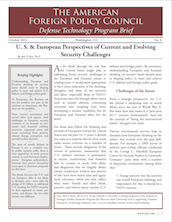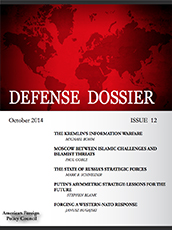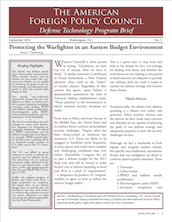South Asia Security Monitor: No. 354
Wagah border terror attack;
India opposes UN votes on nonproliferation;
Sri Lanka opens port to Chinese sub again;
Pentagon calls out Pakistan
Wagah border terror attack;
India opposes UN votes on nonproliferation;
Sri Lanka opens port to Chinese sub again;
Pentagon calls out Pakistan
New guidelines from the Ministry of Education;
Beijing eyes agriculture, rural land reform
Twenty-five years ago, the opening of the Berlin Wall transfixed the world, but somewhat obscured a bigger story: the peaceable seizure of the state by that part of East German society that did not want to go to the West.
A quarter-century ago this month, East Germany's communist leaders announced they were opening the Berlin Wall in an act that, as much as anything else during that momentous year, symbolized the Cold War's end.
Lebanese military takes rebel stronghold;
Houthis battle Al-Qaeda with government support;
Fight against ISIS update;
Hopes dwindle for Boko Haram ceasefire
Greater cybersecurity for Russia's strategic arsenal;
Ukraine-related economic woes persist
To say U.S.–Israeli relations are on the rocks would be something of an understatement. It has been quite obvious for some time that diplomatic ties between Jerusalem and Washington have become badly frayed, with President Obama and Prime Minister Netanyahu failing to see eye to eye on a range of issues. Even so, bilateral relations are now unquestionably at a new nadir, as a recent bombshell article by Jeffrey Goldberg in The Atlantic details.
India bolsters defense;
Vietnamese PM Nguyen Tan Dung visits India;
Sri Lanka bans foreigners from buying land;
Xi visits Pakistan postponed
Taiwan president calls for democracy in Hong Kong, mainland;
India fortifying border with China
Dusting off Dzerzhinsky;
Friendship with China, adversarialism with Japan
Russia shows no sign that it is willing to de-escalate tensions with the West. Indeed, Foreign Minister Sergei Lavrov has made clear that he anticipates a long-term freeze in ties with Washington.

As we think through the role that the United States might play in addressing future security challenges in the European and Eurasian arenas in coming years, it would seem appropriate to have some indication of the thinking, thoughts, and ideas of our partners and allies—especially those in NATO. Americans may feel strongly about issues such as missile defense, countering terrorism and stopping Iran from developing a nuclear capability, but do European and Eurasian allies feel the same?...
Sometimes, it's difficult to see the forest for the trees. Optimism may currently be running high in Washington that next month's deadline for negotiations will yield some sort of durable deal over Iran's nuclear program. But amid all of the diplomatic euphoria, one aspect of the Iranian challenge has received remarkably short shrift: its expanding presence and activities in our own hemisphere.
China and Russia partner on fast neutron nuclear reactors;
Peoples Daily targets multinationals for tax evasion
Putin: Russia's Hercules;
Tactical nukes to Crimea
Recently, Human Rights Watch reported that both sides in the war on Ukraine had employed cluster bombs. The story, however, quickly received a curious spin. In an article for the New York Times, Andrew Roth headlined that Ukraine alone had employed these weapons.
Turkey steps closer to coalition against ISIS;
Houthi rebels 'welcome' new Yemeni Prime Minister;
Tunisia cracks down on extremism;
Baghdad bombings kill dozens;
Head of Iran's Basij threatens Saudi
North Korea upgrades missile test site;
Chinese ICBM test highlights missile modernization...;
...as Pakistan thinks big;
Poland sticks to its guns;
U.S. one step closer to a gulf missile shield
China halts weapons supplies to South Sudan;
PLA parades around disputed islands for 65th anniversary of PRC
Some energy assistance for Ukraine;
Foreign exchanges on ice
ISIS flags appear in Kashmir;
Bangladesh won't join anti-ISIS coalition;
UN denies PAK request for Kashmir intervention;
India and Canada clinch nuclear deal
Western views toward Israel have returned to Kafkaesque normalcy after a brief break for sanity, as the United States now argues that the Israeli-Palestinian conflict is making Islamic State group recruiting easier, and Europe punishes Israel and rewards the Palestinians for their ongoing conflict.
Last month yet another standoff at the disputed China-India border reached yet another peaceful conclusion, though not before spoiling the atmosphere of Chinese President Xi Jinping’s inaugural visit to India. In mid-September, as many as 1,000 Chinese soldiers crossed the Line of Actual Control (LAC) in Ladakh, Kashmir and were met in a prolonged face-off by an equal number of Indian troops. While violations of the de facto border are a common affair, the conspicuous timing and motives of the latest intrusion, and its broader implications for Sino-Indian relations, merit greater scrutiny.
Nothing could be more curious to Muslims than Western non-Muslims telling them what their religion is about. Would not Christians find it odd to hear from Muslims what the true meaning of their religion is? Nevertheless, after almost every terrorist act against a Westerner, particularly the more gruesome ones like beheadings, Western heads of state reflexively react with protestations that such acts are absolutely un-Islamic, despite the explicit claims of their perpetrators that they are done precisely as religious acts, as they exultantly declare, “Allahu Akbar.”
With the Islamic State group on the march again and Baghdad under new threats, it is a good time take care of some unfinished business in Iraq.
Jitters in Poland... and an emerging U.S.-Russian sub race;
Moscow’
s plan to defend ethnic Russians
PM Modi visits the US;
Pakistan, China conduct bilateral naval exercise;
Pakistan endorses BSA;
India-Pakistan border violence
University of Chicago latest to shutter Confucius Institute;
China ready to invest in Russia-occupied Crimea
Putin versus the Internet;
A new nuclear ally in Africa
Monday's reported explosion at Iran's secretive Parchin nuclear site - leaving two dead and shattering windows 12 kilometers away - is welcome news to those concerned about Tehran's nuclear progress, but it's likely a mere blip on what seems an increasingly smooth Iranian road to nuclear weaponry.
For a host of reasons, Washington is growing ever-more desperate for a nuclear deal through which to claim a diplomatic victory, while Tehran is growing less concerned about the ultimate outcome of the ongoing talks and, not surprisingly, more intransigent about offering new concessions.
Beijing wants more Han-minority marriages;
China-India border standoff
China tightens restrictions on foreigners working in Beijing;
Fox Hunt 2014 seeks to track down corrupt officials

The Kremlin's Information Warfare
Moscow Between Islamic Challenges And Islamist Threats
The State Of Russia's Strategic Forces
Putin's Asymmetric Strategy: Lessons For The Future
Forging A Western-Nato Response
Russia faces more sanctions;
Some energy pressure on Poland
The Obama administration’s strategy for destroying the Islamic State group, also known as ISIS or ISIL, forces the United States to take sides in Syria’s civil war. But in a three-way war, that can mean taking the wrong side.
A tit-for-tat on the Korean Peninsula;
In Ankara, dithering over missile defense;
Should NATO's missile shield shift to target Russia?;
Moscow focuses on missiles;
Iran's missiles up the ante
Amid Ukraine crisis, more messaging to the Middle East;
A bailout for Rosneft
The president sets U.S. foreign policy but, with regard to Ukraine, Congress has an opportunity to push the United States in a more fruitful direction by approving bipartisan legislation from the Senate that would give Kiev $350 million in military aid to help it fend off Moscow’s advances.
India: No “
One China”
policy without “
One India”
policy;
Beijing wants to host 2022 Winter Olympics
Mr. Poroshenko goes to Washington;
Putin eyes the Baltics and Eastern Europe
NATO moves, and Kremlin countermoves;
The consequences of Moscow-Cairo cooperation

Winston Churchill is often quoted as saying, “Gentlemen, we have run out of money. Now we have to think.” A similar statement is attributed to Ernest Rutherford, a New Zealand physicist often cited as the “father” of nuclear physics. Regardless of who uttered this quote, many believe it appropriately summarizes the state of America’s defense establishment today. “Fiscal austerity” is the environment in which national security decisions are made...
"We shall proceed with reform and opening up without hesitation," said Chinese President Xi Jinping to his country's top leaders at a symposium last month that marked the 110th birth anniversary of his predecessor Deng Xiaoping. At first glance, his pledge appeared sincere. In the two years since taking office, Xi has consistently advocated a reform agenda intended to continue the economic revitalization and restructuring that Deng started in 1978. Xi’s campaign includes plans to reduce government meddling in the economy by making it easier for private-sector firms to compete with state-owned enterprises (SOEs) and allowing companies and individuals to invest and borrow more freely.
NATO moves, and Kremlin countermoves;
The consequences of Moscow-Cairo cooperation
Property prices dropping across China;
Far fewer North Koreans crossing border into China in 2014
She was at her high school in Chibok, Nigeria when the Islamist monsters of Boko Haram arrived in April, brandishing their guns and forcing the girls onto trucks for an unknown destination.
Fearing where the trucks would take them, she and a friend jumped off during the trip, scampering into the forest. With her friend injured from the fall, they slept under a tree and then found a shepherd to help them find their way back to their village, where their parents and other relatives were weeping.
Quite suddenly, all eyes are riveted on the Islamic State (IS). Ever since its self-proclaimed “emir,” Abu Bakr al-Baghdadi, declared the creation of a new “caliphate” during a speech in Mosul, Iraq this June, his group has become global public enemy number one.
Last week, President Barack Obama pledged to destroy the Islamic State group (also known as ISIS or ISIL). It is worth asking what that means, and whether the United States can actually do it.
What a difference a couple of months can make. This summer, the Bipartisan Policy Center released a new report from Thomas Kean and Lee Hamilton, the original co-chairmen of the 9/11 Commission. That study, titled "Today's Rising Terrorist Threat and the Danger to the United States," warned that America was running the risk of becoming a victim of its own counterterrorism success.
Senior Taiwan official charged with leaking secrets to mainland;
Chinese fighter harasses U.S. surveillance plane